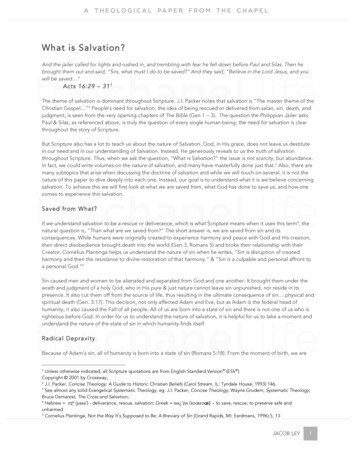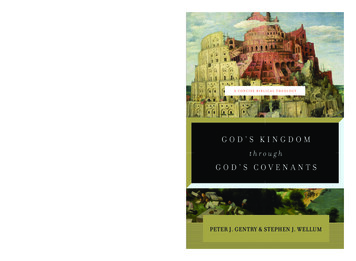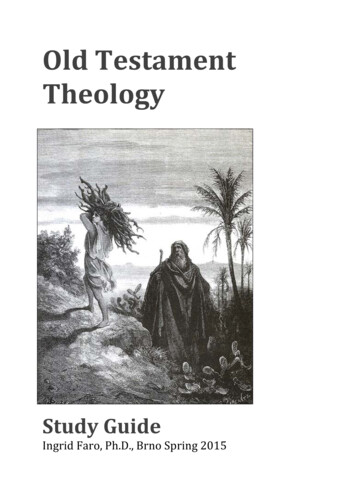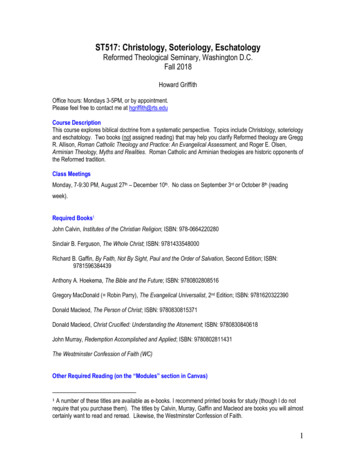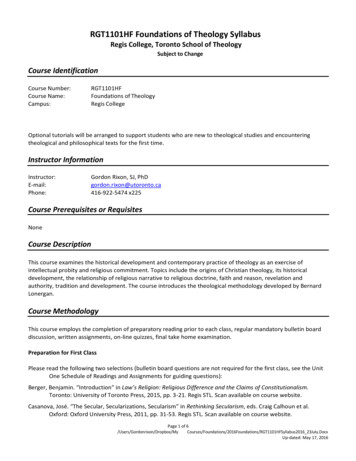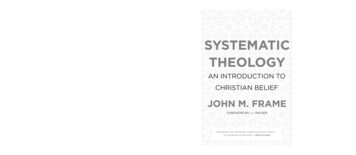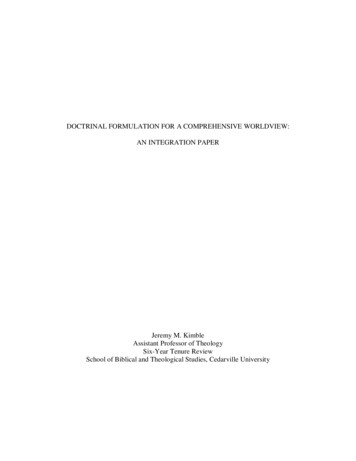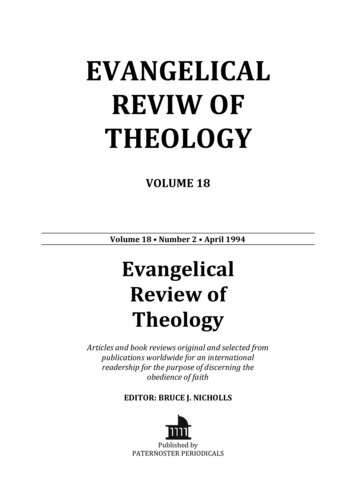
Transcription
EVANGELICALREVIW OFTHEOLOGYVOLUME 18Volume 18 Number 2 April 1994EvangelicalReview ofTheologyArticles and book reviews original and selected frompublications worldwide for an internationalreadership for the purpose of discerning theobedience of faithEDITOR: BRUCE J. NICHOLLSPublished byPATERNOSTER PERIODICALS
forWORLD EVANGELICAL FELLOWSHIPTheological Commission p. 98ISSN: 0144–8153Vol. 18 No. 2 April–June 1994Copyright 1994 World Evangelical FellowshipEditorBruce J. NichollsAssisted by Kathleen D. NichollsCommittee(The Executive Committee of the WEF Theological Commission):Peter Kuzmič (Chairman), Bong Rin Ro (Secretary),Pedro Arana, Wilson Chow, Rene Daidanso Ma Djongwe,Ward Gasque, Emmanuel Gbonigi, Rolf HilleEditorial PolicyThe articles in the Evangelical Review of Theology reflect the opinionsof the authors and reviewers and do not necessarily represent those ofthe Editor or Publisher.Manuscripts, reports and communicationsshould be addressed to the Editor and sent to73 Kohimarama Road, Auckland 1005 New ZealandThe Editor welcomes recommendations of original or publishedarticles or book reviews that relate to forthcoming issues for inclusionin the Review. Please send clear copies of details to the above address. p. 992
EditorialThere are approximately 5,000 slum colonies in Bombay. More than half of Bombay’s 10million plus inhabitants live in dehumanizing conditions of poverty, inadequate housing,sanitation and water. They are the unevangelized of this city. Less than 10% of Bombay’s600 churches work among them. They leave it to the para-church agencies who are ableto reach only a fraction of the people in need.Calcutta is the same stow, only worse. Half a million children from 3 years upward toilon an average 14 hours a day in factories and in cottage industries in shameful conditionsearning less than 5 dollars a month. There are at least 20,000 child prostitutes in Calcutta.Jesus cares; do we his disciples?At the beginning of his ministry Jesus announced his manifesto in the synagogue atNazareth, ending with ‘Today this scripture is fulfilled in your hearing’ (Luke 4:21).In him the Kingdom had come. Empowered by the Spirit he preached good news to thepoor and through them to the whole community. The response of the poor was a sign tothe rich, perhaps the only sign they would respond to. Ministry to the poor authenticatesthe good news for all people.The dichotomy between evangelism, church growth, compassionate service and socialjustice is a judgement on both the theology and practice of the Church. Liberals givepriority to justice, evangelicals to evangelism or to compassionate service—with theresult that we all fail in church planting. The poor neither hear nor see the gospel. Theyremain unevangelized. Commando raids from the outside are no answer. Onlyincarnational servant-hood will be able to train the poor to reach their own people. Butthe cost is more than most of us are willing to bear. The love of Christ and the empoweringof the Holy Spirit alone can enable the Church to fulfil this ever-widening task.This issue of ERT is dedicated to the Consultation ‘The Evangelization of the Poor’sponsored by the Ethics and Society Study Unit of the Theological Commission of WEFand held October 17–23 1993 in New Delhi. Seven women and fifteen men participateddrawing together theologians and practitionersp. 100 from ten countries. Thehermeneutical process involved a serious dialogue between the Scriptures and a widerange of case studies and theological reflection. The result is a creative and living theology.A selection of papers and case studies is included in this issue. A larger book and studyguides for churches and missions will follow. p. 101Priorities in Our Common Task: Ministryto and with the PoorBruce NichollsPrinted with permissionThe consultation, The Evangelization of the Poor was held in New Delhi, India, 17–23October and was sponsored by the Ethics in Society Study Unit of the Theological Commissionof the World Evangelical Fellowship. Twenty-two theologians and practitioners participated3
and gave papers or case studies. As Coordinator of the Consultation, I was privileged to givethe opening address. In it I attempted to review our failures, the ever-increasing dilemmasof the Church’s ministry with the poor and to call for a fresh vision and commitment toidentify with the poor in our common task.EditorI. A CONFESSION OF FAILUREWe must begin this consultation by confessing to Almighty God that as local churches wehave failed in our ministry to the poor. There are exceptions of course, but in the majorityof churches that we represent, we have not been faithful to our Lord’s call or followed hisown example to reach the poor for Christ. We have neither served them nor evangelizedthem. We confess there are very few churches among the urban poor and slums of ourcities. We thank God for the example of the para-church agencies—the relief anddevelopment agencies and the missionary societies—that have identified with the poorin sacrificial service and witness as they are able. We will hear some good case studies inthis consultation.Some denominational bodies have ambitious schemes to serve the poor but few havebeen able to implement them. We also thank God for the many institutions— p. 102hospitals, schools, orphanages, and agricultural institutes—that are ministering to thepoor but this does not relieve local churches of their responsibility to reach out to thesewho are deprived and oppressed. With the exception of the Pentecostals and someCatholic churches or base communities as in Latin America, we are a middle classcommunity, establishing middle class churches in middle class suburbs. Our attempts atevangelism have been hit and run and not incarnational. Alas our churches are inwardlooking, preserving their gains against a hostile world. In many countries we are a ghettoChurch. We are fragmented often through no fault of our own. Our churches are absorbedin managing the institutions inherited from the overseas missionary agents. This has ledto multi-litigation and further fragmentation of the Church. As we come together let usconfess our sin and ask the Lord for forgiveness.II. THE POOR ARE THE UNEVANGELIZEDThe AD 2,000 and Beyond Movement has identified the 10/40 latitude window aroundthe globe as the belt of unevangelized people. It is significant that the majority of the poorlive in the same region. Despite advances in technology and communications the numberof the poor in the world is rapidly expanding. Fifty percent of Bombay’s 10 million peoplelive in slums. By 2020 it will be 75%. Five percent of the people of India are very rich andown more than 50% of the land while more than 50% of the population live below thepoverty line. Among this 50%, at least in the cities, there are very few churches.We live in an age of escalating violence—abortion, female infanticide, rape, murder,arson, terrorism, civil war. Violence brings rich countries to poverty, and povertyintensifies violence. Uganda, Ethiopia, Burma, Cambodia, to name a few, were once richcountries, but now they are desperately poor.Violence and poverty increase the incidence of disease. The threatening scourge ofAIDs, especially in the poor countries, further adds to suffering, death and poverty.The women of the poor suffer greater oppression than men. Their educational levelsare lower; they work longer hours, they are harassed and abused by the male membersof society. Children are being sexually abused and forced to work long hours in factories.The village poor become bonded labourers.4
III. A CALL TO THINK MORE DEEPLY ABOUT THE GOSPELAt the heart of the gospel is good news about relationships. Humankind—male andfemale—are relational beings. Each has a personal relalionship to other personal beings.Our self-understanding as persons is in relationship to others., A person in isolation is anon-person. Our primal relationship as human beings is in relation to God our Creator.Being created in the image of God all people have a deep hunger for God. In the Fall weare sinners and in our rebellion against God this relationship with the Divine isfragmented and broken. We are self-centred not P. 103 God-centred. We recreate God inour image and we worship the gods we have created.The Gospel is good news that in the Cross Christ has atoned for our sin and in ourrepentance and faith the relationship is restored. We become new men and women inChrist.The gospel is good news about Jesus Christ who at great cost emptied himself andbecame one with us, dying in our place and rising again for our justification. In theresurrection of Christ we are given hope of the transformation of the whole person, spiritand body, as one integrated person. Therefore, the gospel is both spiritual and material inits relationship. Evangelism is the verbal proclamation of the gospel to the whole personin relation to God and one’s neighbour. Social justice is the gospel of transformed socialrelationships in the light of our relationship to God in his attributes of love and justice.While evangelism and social justice are distinct in their focus, they both address issues ofbroken relationships with God and with human society. There can be no dichotomybetween loving God and loving one’s neighbour. Together they are the sum total of thecommandments of God.The gospel is addressed to all people but in particular to the poor, for the poor arethose who suffer more than others from spiritual despair, material deprivation and socialostracism as Jesus outlined in his Nazareth ‘Manifesto’ (Luke 4:14–22). Those who arepoor in spirit are those who in their powerlessness cry out to God for mercy. To thembelongs the Kingdom of God.In giving priority to the salvation and liberation of the poor Jesus gives a model for theredemption of the rich and powerful. They must humble themselves, acknowledge theirhelplessness and look to Christ for salvation.The liberation of the poor demands the liberation of person—individual andcommunal—from the bondage of religious fatalism, idolatrous and cultic practices andfrom a state of guilt and shame. This liberation also demands a recovery of human dignitythrough meeting the personal needs of food, clothing and housing and establishing mutualrespect with others. The miracle of the gospel is the transformation of individuals, familiesand communities, and also of the structures of society, economic and political. At its veryheart this requires a transformed human nature. Chou en Lai of China was right when hesaw that unless human nature were changed, Marxism would not succeed in transformingsociety. The message of the gospel is that God in Christ alone can change human natureand create the new society.IV. THE CENTRALITY OF THE CHURCH IN MISSION AND EVANGELISMIn the words of the Lausanne Covenant, ‘The Church is at the very centre of God’s cosmicpurpose and is his appointed means of spreading the Gospel.’ The Church is both thebelieving community of the people of God, and the necessary structure of order to enablethe Church to fulfil its mission in the world. P. 1045
In the Old Testament the institutionalizing of Israel in monarchy, priesthood andprophethood was designed by God for the salvation of the people and the elimination ofpoverty (Lev. 25). But unfortunately institutionalized Israel became the agent of povertyand oppression. We see this clearly in our Lord’s rebuke of the Pharisees and the Scribesof the law.Tragically, the same has happened in the Church. A classic example is the RomanCatholic Church in Latin America where the people have been oppressed and reduced topoverty. Thus one of the central concerns of this consultation must be the renewal of theChurch in all the dimensions of its life. In the midst of the celebration of the building ofSolomon’s temple, God called the people to return to the Lord and receive forgiveness andthe healing of the land (2 Chron. 7:14). The renewal of the Church for mission includesrenewal in the power of the Holy Spirit, reformation in theological understanding, ethicalcleansing in the purity and honesty of the Church’s administration. It also demands arenewed missiological vision for the whole world beginning with a new vision for thepoor. For where there is no vision the poor perish.Above all else our mission to and with the poor calls for a deeper commitment to Christand his Church. We love him because he first loved us. Such discipleship is costly, forfollowing him means taking up our cross daily.May this consultation be a catalyst for a new vision, and a new commitment to Christand to the poor.——————————Dr. Nicholls relocated from New Delhi to Auckland, New Zealand from where he willcontinue his several Asian and international ministries. p. 105Evangelism and the PoorBong-Ho SonPrinted with permissionIn this carefully reasoned article the author analyzes the different types of human sufferingand the relationship of poverty to sinful lifestyle, to structural evil and to being poor in spirit.He raises issues in the relationship of salvation to liberation from poverty. In evangelizingthe poor, he argues, distinctions need to be made between the absolute poor, the relativelypoor and the voluntarily poor. He calls on evangelists to accept voluntary poverty in orderto witness to the poor.EditorMore than half of the world’s population live in 24 poor nations. Of the ten countries withthe largest number of non-Christians, eight have serious problems with poverty.1 Bringinga witness of Christ to the poor has become one of the heaviest burdens of Christians today.We have a large obligation to motivate ourselves for the task, to be equipped with effectivestrategies, and to go into action.1Tom Houston, ‘Good News for the Poor’ in Transformation, Vol 7, No. 1 (Jan./ March 1990), p. 6.6
7
I. POVERTY AND SUFFERINGThe poor require our attention because they are suffering people. According to TomHouston, ‘The poor to whom Jesus and the early church brought Good News included thenaked, the hungry, the disabled, the oppressed, the imprisoned, the sick, the bereaved,widows and orphans.’2 People thus qualified become poor and the poor can very easilybecome one kind or more of the people mentioned. Evils usually come in groups andpoverty represents many negative sides of human life. The poor in the Bible, P. 106especially in Luke and Acts, represent suffering people.1. Physical PainSuffering physical pain is the primordial experience of man which cannot be reduced toany other experience. It is the final criterion of all that is negative. Everybody except a fewmasochists dislikes and tries to avoid pain. This is why all forms of punishment inflict paindirectly or indirectly upon the culprits.Animals also suffer physical pain; pain which is direct and immediate. But men arealso destined to suffer, in addition to physical pain, psychological and social pain. Some ofthese pains are directly or indirectly related to the physical, while some of them are notrelated but may be just as painful.All suffering calls for our genuine attention and compassion. We pay attention toanything unusual, but unless it is related directly or indirectly to suffering, we are not soserious about it. We can be somewhat playful about other things. With anything, however,which has to do with suffering, either of ourselves or of others, and either in this world orthe next, we cannot be anything but earnest and concerned. We can even speculate thatthere would be no need or desire for salvation if men were free from suffering. Withoutsuffering, we would not have had the culture we have now and might have become someother kind of living beings than the ones we are.Hunger is one of the most primitive and common forms of pain, and as such it is oneof the most severe. It is not only painful in itself, but it is also the cause of many otherpains and sufferings as Tom Houston has listed.Malnutrition, exposure to excessive heat and cold, and other forms of physicaldiscomforts are hard to bear in themselves, but they also threaten further pains. Menshare the physical pain of hunger and cold with animals, but men are gifted or cursed withimagination to fear future pains which may aggravate them.2. Social and Psychological SufferingWhat makes poverty still more painful is its social and psychological effect. The poor feelnot only helpless, desperate and angry but they are also ashamed of themselves. They feelinferior and deprived of their human dignity. The sense of shame and indignity issubjective but it depends to a great extent upon the attitude of others toward them. Thepoor are disliked and deserted by society (Prov. 14:20; 19:20), and it is especially difficultin the societies of the so-called shame cultures where one’s subjective attitude isdecisively influenced by the way others look on an individual.One is ashamed of oneself when certain negative consequences are supposed to havebeen caused by one’s own faults or moral shortcomings. The poor are regarded in mostsocieties as not entirely free from moral blame.2Idem., pp. 4–5.8
Poverty is looked upon as a curse of supernatural forces, and the latter are regardedas irresistible but not always wholly capricious. There must be some reason for the curseeither in the afflicted person or in some of their ancestors. In a word, p. 107 the one cursedwith poverty is suspected of certain moral failure which has invited the misfortune.The universal phenomenon of associating poverty with moral failure finds its root inambiguities in interpretation of the causes of poverty. Laziness is counted as the primarycause of poverty in most cultures. In fact, there are many who are poor because they aresimply lazy. Careless living, over-spending, speculation etc., are undoubtedly directcauses of poverty. One cannot, therefore, criticize as totally groundless the association ofpoverty with personal blame.Many social determinists, including some Christian theologians, blame the structuralinjustice of capitalistic societies as wholly responsible for poverty. It is true that socialoppression is a fundamental cause of poverty. 3 But one cannot explain all cases of povertyand other personal ills in terms of unjust social structures. Various personal traits such aslaziness, unreasonable speculation and dishonesty are also to blame. Those personaltraits are also indirect consequences of wrong structures, but such an explanation is toodeterministic for Christians to accept. Samuel and Sugden report that ‘a repeatedexperience throughout the world is that the poor respond to the gospel and after three tofour generations become economically middle class’.4 This seems to be clear proof of thefact that a change in one’s outlook can exert at least some influence upon the economicstatus of a person or(?) of his descendants.But not all nor even a majority of cases of poverty are due to any moral failure of thepoor themselves or of their ancestors. Since the last century, sociologists andphilosophers have made it clear that the majority of the poor are victims of social injusticerather than moral culprits.At the same time, the plain and undeniable fact that many poor people are lazy andcareless confuses our general judgment upon poverty. Even in those cases where lazinessis not the direct cause of poverty, people are not always patient or careful enough todiscern its true roots. Most of us are content with the stereotypical association of povertywith personal failure, so many poor people have to suffer unjustified defamation. Thusthey are doubly victimized: they suffer undeserved poverty and they receive undeservedblame.The pain of poverty is especially acute when the poor have to be at the mercy of therich for survival or for other necessities of life. To depend upon others’ mercy is itselfhumiliating enough, but the humiliation is often associated with moral blame. There is ageneral impression that to be at the mercy of others means moral inferiority to those whoshow the mercy. In reality, however, the reverse is often true, i.e. the rich are morallyguilty while the poor are their innocent victims. This lopsided relationship holds true notonly between individuals but also and p. 108 more often between countries and classeswithin a country. The world has witnessed this situation between the colonial powers andcolonies, and between the exploiting powers and the exploited. 5 In 1979, a net 40 billionflowed from North to South. In 1990 the South, while still poorer, transferred a net 20Orlando Costas, ‘The Gospel and the Poor’ in V. Samuel and C. Sugden eds., Evangelism and the Poor.Regnum Books, Oxford, 1983, p. 83.3V. Samuel and C. Sugden, ‘Summary of the Workshop discussion on Evangelism and the Poor’, Idem., p.137, 138.4Ronald Sider has convincingly analyzed how the lopsided trade relations between the First World andThird World have caused impoverishment of the latter. See Ronald Sider, Rich Christians in an Age of Hunger.A Biblical Study, IVP, Downers Grove, III., 1978, p. 131ff.59
billion to the North, and if the reduction of commodity prices in the same period wasadded, the annual flow from the poor South to the rich North might be as much as 60billion.6 The pain of poverty will be still more acute when the poor realize the injusticeand yet have to beg for mercy from the immoral rich.The poor suffer shame and indignity today more than at any other time becausemankind has become more materialistic than ever before. In the past, there were thehonourable poor and poverty as such was not always scorned. But the poor are becominga threatened species today. Gradually money has been turned into the standard for allvalues including the value of persons. Even personal dignity seems to depend uponmaterial possessions. The poor today are perhaps better off materially than those of oldendays, but socially and psychologically they are much worse off. This situation demandsthat we be more interested in distributive justice than retributive justice.II. POVERTY IN THE BIBLEBiblical teaching on poverty is ambiguous. Poverty is described sometimes in negativeterms, but sometimes in positive terms. Yet the ambiguity in the Bible is not due toinsufficient discrimination of the causes of poverty. It is due more to practical reasons.On the one hand, poverty is seen as the consequence of laziness (Prov. 6:6–11; 24:30–34), of lack of discipline (Prov. 13:18) and of indulging in pleasure (Prov. 21:17; 23:21). Itis a reason for being shunned and deserted by friends and relatives (Prov. 14:20; 19:4, 7)and oppressed by the rich and powerful (Prov. 14:31; 30:14). The wisdom of the poor isdespised (Eccl. 9:16) and hunger is often punishment from God for the sin of individualsor of a community (Is. 44:12; 65:13). Nowhere in the Bible is material poverty idealized,or asceticism encouraged. Poverty is portrayed as a misery (Job 24:4–5, 9–11).That does not mean that the Bible commends material prosperity. The rich in materialgoods are repeatedly warned (James 5:1–6; Luke 6:24; 1 Tim 6:9), and rebuked when theyoppress the poor (Is. 3:13–15; Jer. 5:26–28, etc.). The rich in material possessions havegreater temptation to be proud in spirit and to oppress the weak and the poor, and that isthe worst aspect of being rich.On the other hand, the poor are often promised the Lord’s protection. Israelites arereminded of their days of being poor and oppressed in Egypt. The poor among them willbe likewise protected and led by the p. 109 same Lord (Is. 14:30; Ps. 68:10; 10:15).God assumes the function of protector of the poor neither because the poor arenecessarily better persons nor because God shows special favour towards them. The Biblemakes it clear that lazy, undisciplined, and pleasure-seeking people become poor and theyare justly disliked by friends and even relatives. We are supposed to work hard not onlyto be self-sufficient but also to be able to help others (2 Thess. 3:6ff.; Acts 20:35). It israther God’s justice which prompts him to be especially concerned with the poor (Ex.23:3, 6; Lev. 19:15; Is. 11:4).Everyone has the right to eat and to be clothed regardless of whether one earns it ornot. The hungry should be fed first of all even with consecrated bread if no other food isavailable (Matt. 12:1; Deut. 23:24–25). The right to eat and to be clothed seems to havepriority over the right of property in the Bible. The Bible also encourages us to providefood and drink for our enemies (Prov. 25:23) because preserving life has priority overanything else. It is unjust for any individual or society to let anyone starve to death.Paupers unable to sustain themselves in most societies are put under the care of theirimmediate family or blood relatives (cf. Lev. 25:25; 25:35, 39). Thus, those poor people6Tom Houston, Op. cit., pp. 7–8.10
who have nobody to take care of them really suffer. In the Old Testament widows andorphans were the ones who were not only poor materially but also socially and legallyunprotected (Is. 10:2; Ezek. 18:12; 22:29; Amos 2:7; 4:1, etc.). When the leaders of Judahexploited rather than protected them the Lord himself had to assume the role of theirguardian (Ps. 14:6; 35:10; 113:7, etc.; Jer. 49:11; Is. 1:16–17, 23–25).The poor in material possessions, however, have the advantage of being also poor inspirit, and that is one aspect of being poor. It does not follow, of course, that the poor arealways humble. In the early stages of socialist revolutions, the poor are not humble andshould not be humble. To the contrary, they are and should be angry at being wrongedand feel rather morally righteous for being exploited rather than exploiting others. But inmost other societies, the poor are humble since they are powerless and have to dependon others for survival. In Luke 6:21, the Lord says ‘Blessed are you poor, for yours is thekingdom of God’, and this does not necessarily contradict Matt. 5:3. ‘While materialpoverty is condemned as a scandalous condition, nevertheless, it constitutes a privilegedpath to the poverty of the Spirit, because those who have nothing have less difficulty inhumbling themselves before God, than those who have riches.’ 7 Those psalmists whodesired earnestly that their prayer be answered stressed that they were poor (Ps. 40:17;70:5; 109:22). It is not only divine justice but also the humility of the poor which putsthem in a favourable position for salvation. God has anointed the Lord to preach the gospelto the poor (Lk. 4:18; 7:22; Is. 61:1). The poor are invited to the banquet of the King p. 110along with the maimed, the lame, and the blind who also must be poor and humble (Lk.14:13).III. SALVATION FOR THE POORThe salvation which believers enjoy now and look for in the future is the same foreveryone who is saved. It is an objective state of being blessed. Yet since we would notlose all our distinct personal identity in the kingdom of God, there must be somedifference in our experience of salvation which would be determined mainly by thesituation from which one is saved. The kingdom of God may be appreciated differently bymartyrs and by robbers who have repented or by the poor differently from the rich. ‘It istrue that all have sinned. But if the poor are oppressed, are sinned against and by natureare dependent on God, why should they experience redemption in the same way as therich who are oppressors and are more sinning than sinned against?’ 8For the poor, salvation should at the least be experienced as liberation from theirpoverty. A kingdom of God where one remains poor would be self-contradictory. The stateof heavenly blessing is often described as an opulent banquet (Matt. 8:11; 22:2ff; 25:10;Lk. 13:29; 14:5ff.) where food and drink overflow. The invited are supposed to be dressedformally (Matt. 22:1ff.). The kingdom of heaven is not a place where one has to worryabout what one shall eat and what one shall wear (cf. Matt. 6:25). God will provideabundantly for every one who is saved. It is also clear that the poor would not bediscriminated against in the kingdom of heaven. It is more likely that they would berecompensed richly for the suffering which they have undergone on earth.Salvation, however, is more than a promise for souls to go to heaven after physicaldeath. The salvation in its holistic sense which we are supposed to preach and witnessincludes the state of ‘already’, i.e. the state here and now of our being under the sovereign7Samuel and Sugden, Op. cit., p. 85.8Idem., p. 135.11
rule of God in which we enjoy the love and saving grace of Christ. If so, then, would thesalvation have any meaning to the poor if they still have to suffer malnutrition and beoppressed and exploited? Evangelical Christians today should wrestle with this difficultquestion if they are truly interested in effectively preaching the gospel to the poor.Except in extreme circumstances, one should be able to survive biologically and meetthe basic needs of life in order to experience salvation. One should also be able to maintainone’s faith and hope in the ultimate justice of God, although one cannot experience it inone’s own society. Considering the present conditions of justice in most societies, the poorare in a difficult position to experience holistic salvation. The spiritual advantage of thepoor of being humble is offset by the disadvantage of social obstacles to believing andenjoying holistic salvation. p. 111IV. EVANGELIZING THE POORIt is generally true that the poor are more religious than the rich. 9 They easily recognizetheir own inability to escape the miseries and injustices they suffer and look for somesupernatural power to liberate them.This does not imply, however, that the poor are always easily accessible to the gospel.Very often in the Third World the more religious a person is the more difficult it is to reachhim with the Christian gospel. Poor persons who have little opportunity for moderneducation are i
THEOLOGY VOLUME 18 olum 18 umr 2 April 1994 Evangelical Review of Theology . Violence brings rich countries to poverty, and poverty intensifies violence. Uganda, Ethiopia, Burma, Cambodia, to name a few, were once rich countries, but now they are desperately poor. Violence and poverty
